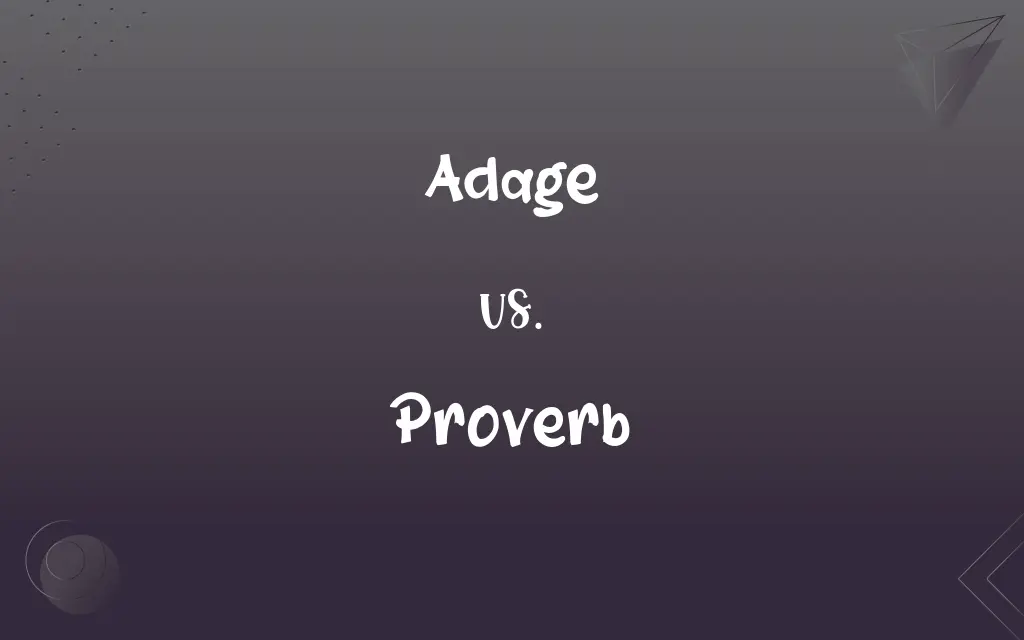Adage vs. Proverb: What's the Difference?
Edited by Janet White || By Harlon Moss || Updated on October 23, 2023
An adage is a short, memorable saying conveying a general truth, while a proverb is a popular, time-tested saying that imparts wisdom or advice.

Key Differences
An adage is recognized for its brevity and universal applicability. It succinctly presents a broad truth or piece of advice, stemming from common observations or experiences. Adages often become integral to cultural dialogue due to their concise nature and resonance with human experiences. Contrarily, a proverb is deeply rooted in cultural or societal wisdom. Typically, proverbs have been passed down through generations, gaining credibility and acceptance over time. They usually offer insights or life lessons derived from collective experiences and historical events.
Though both adages and proverbs provide guidance, their origins might differ. An adage might arise from more recent observations or statements, without necessarily having ancient roots. In contrast, proverbs tend to have a longer historical lineage, reflecting ancient wisdom and cultural beliefs. Moreover, while every proverb can be an adage due to its nature of conveying truth, not every adage qualifies as a proverb because it might lack the time-tested wisdom inherent to proverbs.
Furthermore, the familiarity and frequency of use can distinguish adages from proverbs. Some adages become popularized quickly due to their relevance and applicability, even if they don't have an ancient backdrop. Proverbs, however, have stood the test of time and remain consistent in their imparted wisdom, even as societies evolve.
In essence, while both adages and proverbs serve to enlighten and guide, adages are general truths framed succinctly, often without the weight of history behind them. Proverbs, on the other hand, are revered sayings steeped in historical wisdom and cultural significance.
Comparison Chart
Definition
A short, memorable saying conveying a general truth.
A popular, time-tested saying imparting wisdom or advice.
ADVERTISEMENT
Origin
Can be more recent or ancient.
Typically ancient and passed down through generations.
Popularity
Might gain rapid acceptance based on relevance.
Accepted and recognized due to historical weight.
Length and Structure
Usually concise and to the point.
Might be longer, often structured as advice or lessons.
Cultural Significance
Relevant due to its truth, not necessarily cultural history.
Deeply rooted in cultural or societal wisdom.
Adage and Proverb Definitions
Adage
A universally applicable observation made succinctly.
The adage every cloud has a silver lining encourages optimism.
ADVERTISEMENT
Proverb
A time-tested saying passed through generations.
The proverb it takes a village to raise a child speaks to community involvement.
Adage
A brief statement expressing a universal truth.
The adage actions speak louder than words highlights the importance of deeds over words.
Proverb
A traditional saying expressing a common cultural wisdom or truth.
The proverb birds of a feather flock together comments on like-minded individuals grouping.
Adage
A concise remark encapsulating a general piece of advice.
The adage out of sight, out of mind warns of forgetting things not regularly seen or considered.
Proverb
An old adage recognized for imparting lessons or insights.
The proverb the early bird catches the worm promotes the benefits of starting early.
Adage
A memorable saying derived from common observations.
The adage a stitch in time saves nine advocates for addressing issues promptly.
Proverb
A widely accepted piece of advice rooted in historical wisdom.
The proverb don't count your chickens before they hatch warns against premature assumptions.
Adage
A saying that quickly gains popularity due to its relatability.
The adage when in Rome, do as the Romans do promotes adaptability.
Proverb
A statement reflecting societal values and shared experiences.
The proverb a rolling stone gathers no moss advises against stagnation.
Adage
A saying that sets forth a general truth and that has gained credit through long use. See Usage Note at redundancy.
Proverb
A short pithy saying in frequent and widespread use that expresses a basic truth or practical precept.
Adage
An old saying which has obtained credit by long use.
Adage
An old saying which has been overused or considered a cliché; a trite maxim.
Adage
An old saying, which has obtained credit by long use; a proverb.
Letting "I dare not" wait upon "I would,"Like the poor cat i' the adage.
Adage
A condensed but memorable saying embodying some important fact of experience that is taken as true by many people
FAQs
What distinguishes an adage from a proverb?
An adage is a concise saying conveying truth, while a proverb is a time-tested saying offering wisdom.
Can a saying be both an adage and a proverb?
Yes, if it's a concise general truth with time-tested cultural significance.
Are proverbs always based on ancient wisdom?
Most proverbs are rooted in historical and cultural wisdom, passed down through generations.
Why are adages important in rhetoric?
Their concise nature and universal truths make them persuasive tools in arguments.
Can a modern saying become an adage?
Yes, if it succinctly conveys a general truth and gains popularity.
Can an adage evolve into a proverb over time?
Yes, if it gains cultural significance and is passed down through generations.
How do adages gain popularity?
By being relevant, relatable, and resonating with universal experiences.
Why are proverbs considered valuable in education?
They impart cultural wisdom, life lessons, and societal values.
Do adages always offer advice?
Not necessarily, they mainly convey general truths.
Do proverbs always have a moral lesson?
Most proverbs convey moral lessons, insights, or advice based on cultural wisdom.
Can an adage be a proverb, but not vice versa?
Every proverb can be an adage, but not every adage has the time-tested wisdom of a proverb.
Can an adage vary across languages?
The core truth remains, but phrasing might vary based on language and cultural nuances.
Why do proverbs often employ metaphors?
Metaphors make proverbs more vivid, memorable, and relatable.
Can an adage lose relevance over time?
Yes, if societal changes render the truth it conveys less pertinent.
Do adages originate from specific cultures?
While some might, adages generally convey universal truths without cultural specificity.
Why are proverbs significant in literature?
They encapsulate cultural wisdom, adding depth and context to literary works.
How are proverbs preserved in societies?
Through oral traditions, literature, and cultural practices.
How do proverbs differ across cultures?
The core wisdom might be similar, but presentation and references can vary based on cultural contexts.
Are proverbs unique to specific cultures?
While some proverbs are culture-specific, similar versions can exist across cultures.
Are all adages widely known?
No, some might be lesser-known, while others gain widespread acceptance.
About Author
Written by
Harlon MossHarlon is a seasoned quality moderator and accomplished content writer for Difference Wiki. An alumnus of the prestigious University of California, he earned his degree in Computer Science. Leveraging his academic background, Harlon brings a meticulous and informed perspective to his work, ensuring content accuracy and excellence.
Edited by
Janet WhiteJanet White has been an esteemed writer and blogger for Difference Wiki. Holding a Master's degree in Science and Medical Journalism from the prestigious Boston University, she has consistently demonstrated her expertise and passion for her field. When she's not immersed in her work, Janet relishes her time exercising, delving into a good book, and cherishing moments with friends and family.































































